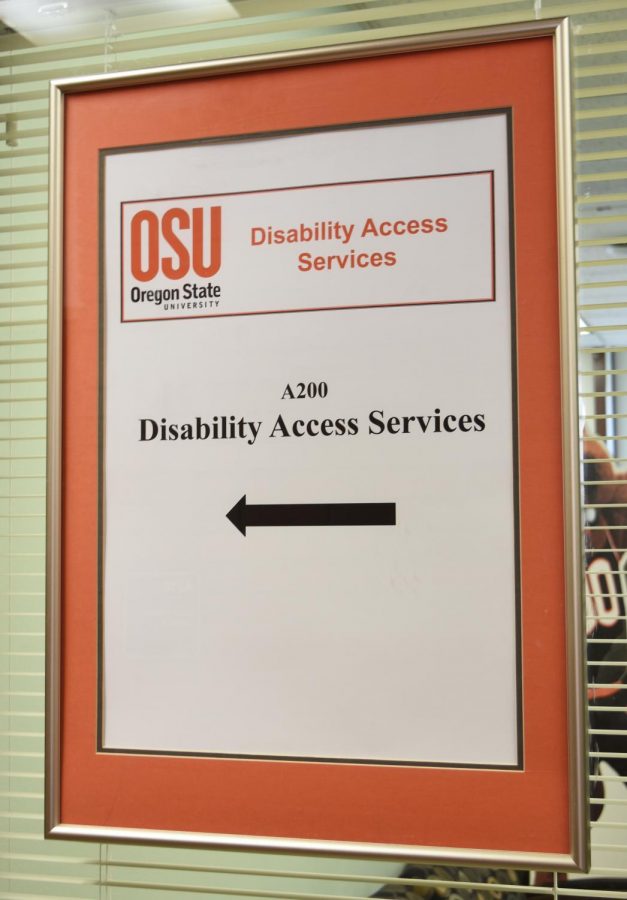OSU Disabled Student Union, Disability Access Services fight against discrimination, aim to educate
April 7, 2020
Many Oregon State University community members are demanding that more education, connectivity and activism are put in place for students that live with disabilities.
Kobey Bonin, graphic design student, diversity learning assistant and vice president of the Disabled Students Union, said his club works hard to lay the groundwork of a more supportive environment for students with disabilities.
“We want to serve as a resource and a voice for disabled students on campus, but also a place for community and connection,” Bonin said. “… It can be kind of isolating for a disabled student on a campus full of able-bodied people, so it’s just nice to have folks who kind of understand your experience to some extent.”
Bonin said better communication and education for OSU faculty is the best way for the university to improve its resources for students with disabilities.
“I think something that could be beneficial is academic advising, if you had someone with an in-depth knowledge of the resources [Disability Access Services] can offer, who could meet with students and really figure out the accessibility plan,” Bonin said. “The other thing about DAS is that they don’t provide services to students (who) either don’t want to or are unwilling to disclose they have a disability, so I think in addition to those resources, part of our club interest is being able to maybe provide resources for students that don’t want to disclose their disability.”
Martha Smith, director of Disability Access Services, said there are multiple avenues that DAS suggests for students struggling with harassment or discrimination.
Smith said many students come to DAS describing structural issues, such as a lack of necessary ramps or faulty elevators. She included that students also come to describe ignorant or insulting comments made by faculty or professional staff. When this happens, DAS does everything in their power to educate the perpetrator and keep the student safe and comfortable, Smith said.
“There are two places on campus, one where anyone can file formal complaints around either harassment, discrimination. One is the Equal Opportunity Access Office,” Smith said. “So they deal formally with investigations of discrimination and harassment on campus, and then the Office of Institutional Diversity has, online, a place where anyone can file an anonymous, if they so choose, bias or bullying incident report…We want to… have the student be safe and not have that behavior continue. So, we try to give students options.”
Smith said that DAS focuses on an “each one teach one” method and is always working to help every student reach their goals and enjoy their experience at OSU.
Andrea Rempel, OSU senior and Resident Assistant and President of the Disabled Student Union said she and the DSU want to reduce all accessibility issues on campus and aid any student with needs of accommodations.
Rempel said communication is critical when recognizing and dealing with harassment and discrimination on campus.
“Students living in our community are not “victims” of their disability, they are rather put in difficult situations because of the way our society functions. An important thing to remember is to maintain boundaries. Most students don’t want some random stranger coming up to them and interjecting themselves into a situation,” Rempel said. “When witnessing any form of discrimination, you should take a second and think to yourself, ‘how would I feel if someone did that to me?’ and ‘how would I feel if someone intervened right now?’ It is important to never assume what someone else needs, and communication is always important.”
Bonin also said, in his personal experiences, communication can help avoid awkward or unnecessary situations.
“I think one way that would be helpful, just in general, is just asking… communication is key. If someone looks uncomfortable and you think you might be able to help, just ask them,” Bonin said. “…as a disabled student, it can be kind of frustrating when people just do things for you… a lot of people will try and hold the door for me on a door that has an automatic door switch, it can sometimes cause more confusion when they open the door, versus if they just walk through the doorway then flick on the automatic door switch..I think it’s just a matter of education, educating people, mostly about communication…”
Rempel and Bonin believe that ignorance is dangerous, and the Disabled Student Union is open to educating anyone and everyone. They urge anyone who is interested in learning more about living with a disability and fighting for the rights of people with disabilities to join the union. They continue to fight to rebuild and strengthen Oregon State systems and communities.
“This does not even take into account the treatment of “invisible” disabilities and mental illness,” Rempel said. “When someone gets up the courage to ask for help and leaves feeling more hopeless because of the things they were told, or the inability to even get an appointment, that is how you know the system is broken.”
























































































































